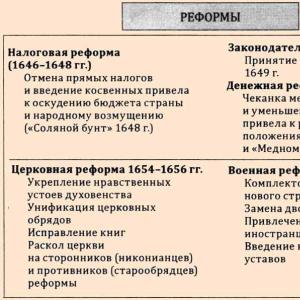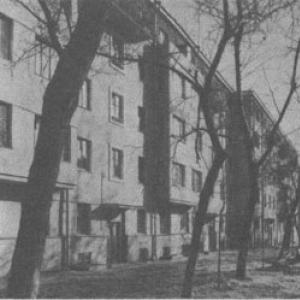USSR school medal variety. How much gold are in school medals?
We will be happy to answer any questions regarding directly Your order or a specific product presented in stock on the website - production time, dimensions, material, method of attachment to clothing.
We do not provide information about the procedure for establishing and presenting state and departmental awards of the Russian Federation: by whom and when the award was established, who was the customer, what edition was issued previously, who is authorized to sign the award document, how to restore a lost award, etc.
After placing an order and checking the availability of products, payment details are sent by email within 24 hours after placing.
After payment, be sure to inform us about the method and date of payment by email to admin@site.
If the payer (recipient) of the order is an organization and you need to receive an invoice, please provide the TIN and details of the organization in the “Comments” field when placing the order.
If difficulties arise, or if you have additional questions, you can send a free-form application by email.
Please write a request to our email...
Delivery by mail: in Russia 10 - 20 days from the date of dispatch, CIS countries and foreign countries - from 2 to 4 weeks.
Delivery times by EMS, SDEK courier delivery, or transport company are specified individually.
Unfortunately, our company does not engage in restoration and production of dummies and copies of awards.
You can contact the online store of souvenir dummies: ordenov.net
Payment details are sent by email after placing an order and checking the availability of products.
In general, the order is processed within 24 hours after placement.
We are happy to work with non-cash payments, providing all the necessary documents to confirm payment (agreement, invoice, invoice).
Because If the organization uses the simplified tax system and is not a VAT payer, we do not provide invoices.
You can place an order for products through the website by selecting “Payment through bank for legal entities” in the Payment Methods, or send an application in free form along with the payer’s details to our email.
If the product is already presented on our website, then place a Pre-Order (“Pre-Order”).
Production according to an individual layout is possible in batches of 50 - 100 pieces.
To clarify the possibility and timing of production, contact the production department - znak@site.
When sending a request, you must provide a model of the product (manual image is allowed), indicate the circulation (from 50 - 100 pcs), production time and contact information.
Production of products according to an individual layout is carried out in batches of 100 pieces.
All products that are in stock are displayed on the website with a “Buy” button. To find an award, enter its name or digital article in the “Search” field and click “Search”.
You can also view all products by sections presented in
To buy items, go to the section you need, indicate the required number of products and place them in the cart by clicking the “Buy” button.
Pay attention to the exact name of the product, the presence of a form, the method of attachment to clothing, etc., because There are a number of products with similar characteristics.
After that, go to the “Cart” (top right) and place your purchase order. Read more about placing an order here.
Discounts are automatically calculated when placing an order on the website if you specify the coupon number: 2% - for repeat orders, 3% for order amounts over 5,000 rubles, 5% - over 10,000 rubles, 8% - over 50,000 rubles. The discount on the coupon and the discount on the order amount are summed up.
Valid for veterans and public organizations.
Discounts do not apply to award daggers and their cases, artistic castings, school medals, and complete collections of AIF orders. Current prices are always posted in the price list.
For orders worth up to 8,000 rubles, sent within the Russian Federation, delivery by cash on delivery with payment upon receipt of the order is possible.
Outside the Russian Federation, cash on delivery is not available.
Orders worth up to RUB 4,000. We ship without prepayment within 2 - 4 business days after registration on the website, if all products are in stock.
If the amount of your order exceeds 4,000 rubles, then we give a 100% guarantee that after prepayment all orders will be shipped to the payer's address. The online store has been operating for more than 3 years without complaints of unfair delivery.
Pickup from a warehouse in Chelyabinsk is free.
Russian Post within the Russian Federation - with advance payment of 350 rubles, cash on delivery - from 390 rubles.
Postal delivery to the CIS countries and abroad - from 450 rubles.
Large, urgent orders, as agreed with the customer, are shipped by courier services and transport companies. The cost is determined individually.
Payment methods for your order:
Cash payment upon receipt at the post office by cash on delivery (in addition to the amount of the order by post, a commission for transferring money is charged, from 50 rubles);
Cash/non-cash payment upon receipt by cash on delivery via SDEK courier service;
Advance payment through mobile applications using the details;
Advance payment by bank transfer for individual entrepreneurs and legal entities.
If you have any difficulties with payment, please contact the online consultant on the website or WhatsApp +7 951 771 0356.
The "Buy" button means that the product is in stock and can be ordered.
The "Pre-order" button warns that the product is out of stock.
Send a message with corrections by email. with the subject line: “Adjustment of order No._.”
If you don't know your order number, please provide your full name.
Pre-order (pre-order) is a collection of applications for the manufacture of a product that is currently out of stock.
If the item can be re-manufactured, we will notify you by email when it becomes available.
Please note that placing a pre-order for a product does not oblige us to immediately begin manufacturing it.
In this case, there are 2 ways.
1. Pre-order (for a batch of 1 piece).
2. If you need a batch of 50 pcs or more, we can manufacture it to your order..
The production time for each product is individual and depends on the number of applications received, the demand and complexity of the product.
By placing a pre-order, you leave us a request for the manufacture of this product.
If the total number of applications is sufficient for the minimum batch (from 50 pieces), then after production we will send a notification by email. email about its availability and you can buy the product on the website.
Please note that placing a Pre-Order does not oblige us to immediately begin production of missing items.
Items from the archive are not available, but some of them can be produced if applications are received for a batch of 30 or more pieces.
To leave a request, you must click the “Pre-order” button, indicate the quantity and your email. We will notify you when the product becomes available.
Please note that placing a “Pre-Order” does not constitute a basis for the mandatory production of missing items.
Blank certificate forms are included with the product if this is indicated in the title (for example, the "100 Years of the Air Force" medal with a certificate form).
If the presence of a certificate is not indicated, in the section you can purchase a standard form without an image of the award.
With a circulation of 50 pcs. The form can be made to your order. To order forms, send a request in any form with a model of the product attached by email. mail: .
Yes, to do this, first prepare a list of product names (as on the website) or a list of product articles of the form item_5674 (the numbers are visible in the address bar or to the right of the product name). You will also need your information to send the order: recipient's full name, address with postal code, cell phone number for notifications about the shipment of the order.
In the old days, graduating from high school with a gold medal was a guarantee that any higher educational institutions were open to the children.
Benefits for gold medalists
The 11th grade certificate was issued in a special format; it was a kind of pass for preferential admission to the most prestigious educational institutions in the country. Of course, this situation also contributed to the emergence of grounds for abuse by the administration of the educational institution. Many high school students dreamed of receiving an excellent certificate for the 11th grade without any problems and being a student of their chosen university without additional exams and problems.

Modern realities
After the collapse of the Soviet Union, enough time passed, society changed, but gold and silver medals remained in educational institutions. Some educational institutions do not take them into account when compiling rating lists of applicants, but most middle and higher-level institutions add points to excellent students and willingly accept such graduates into their walls.
The medal winner must take additional exams along with the rest of the applicants, while the gold medal of the school graduate guarantees priority in situations where several children have the same number of points.
The incentive to receive such a high award as a medal is the opportunity to receive various awards established by city authorities, numerous sponsors, and founding committees of the educational institution.

What are the conditions for receiving a gold medal at school?
Let's try to figure out how to get a gold medal at school. The badge “For exceptional academic achievements” is awarded to students in grades 11 (12) who have only excellent grades in each half-year at the senior level of education. In addition, one of the requirements for presenting this prestigious award is passing mandatory final exams in the form of the Unified State Examination (USE) in the 11th (12th grade) with no lower than a passing score. Currently, such mandatory exams are in two main subjects: mathematics and Russian language.
The conditions for receiving a gold medal at school do not allow such an award to be received by students who studied externally, as well as by those children who received excellent marks when retaking exams.
The decision on whether to award certain students with a gold medal is made by the teaching council of a particular educational institution. Next, the decision is coordinated with local executive authorities and approved by a special order of the school director. Complete secondary education is a chance for children to enter higher institutions and become the owner of a prestigious profession.

Way to success
Many first-graders ask how to get a gold medal at school and systematically move towards the task. You will have to work hard to achieve such a high result. The school administration is trying to provide every possible support to talented children who did not receive a single “good” mark in the 10th grade. If desired, a potential medalist can also obtain additional teaching aids and consultations with teachers outside of class hours. In addition to excellent academic performance, special emphasis should be placed on an active social life. Such guys also succeed in competitions at various levels, conduct research, participate in projects and competitions. Complete secondary education is hard work, especially if the student is studying at full capacity and demonstrates good results in educational activities.

Regulations on awarding the medal “For special achievements in training”
The Ministry of Education of the Russian Federation has developed and approved a special regulation, which specifies all the rules on how to receive a gold medal at school. In addition to “gold”, “silver” is issued.
- Graduates of 11 (12) grades studying in schools that have an official certificate of accreditation have the right to receive such an award. Graduates of vocational primary education institutions who have passed state accreditation can also receive the medal.
- The gold medal “For special achievements in learning” is awarded to graduates who have final grades “excellent” in all subjects for half a year or a year, and who have successfully passed final exams. A similar award is given to graduates of vocational schools who, upon receiving a complete secondary general education, have demonstrated excellent knowledge in all disciplines, including their specialty, in six months or a year, and have passed exams with “5”.
- If in one of the six months a graduate had no more than two “good” marks, he has a chance to receive a silver medal, but he is deprived of the right to receive “gold”.
Graduates who become owners of a gold or silver medal, emphasizing their special successes in the learning process, are awarded a special certificate with silver or gold embossing. Medals are awarded at graduation along with an official document indicating the appropriate level of education.
Conclusion
When answering the question “How to get a gold medal at school?”, you need to understand that children who, in addition to regular academic disciplines, choose various elective and optional courses in their individual curricula can count on such a prestigious assessment of their educational activities. For many modern graduates, being awarded a gold medal at graduation becomes confirmation of high intellectual development. Parents of gold medalists are rightfully proud of their excellent students, because their merits are recognized already during their studies at school. A gold medal is the highest standard that many modern teenagers strive for, whose life plans include further education in prestigious educational institutions of the Russian Federation.
Many schoolchildren who want to receive a gold medal, which is considered the most prestigious award for school achievements, often wonder: is the medal really made of gold? In today's article we will answer this question and also tell you what this reward looks like.
What is a gold medal and its purpose?
The gold medal is considered the highest award given to schoolchildren for academic success. To receive it, you must have A's in all subjects in grades 10 and 11, as well as excellent grades for final exams.
It is believed that this award allows students to enter universities without any problems, but this is not the case. After the introduction of the Unified State Exam, gold medals lost their “magic power”. Nowadays, the admissions committee no longer admires the gold embossing of the certificate. Moreover, medalists do not have any benefits. Their only advantage is an additional score, which is set by the local regional administration after the final exams.
What does it consist of and what does it look like?
School medals appeared about 70 years ago. At that time, they were officially called “gold-plated and silver-plated student medals,” but for some reason this name ultimately did not stick. Answering the question of many graduates and their parents, namely, whether the medal really consists of gold, it is worth noting that the truly “golden age” of medals took place only from 1946 to 1954. Then they were made of pure gold (thickness 3 microns) of 583rd standard, the weight of which was approximately 10.5 grams.
But this was only until 1960, then their composition changed radically. From now on, the word “gold” can only be used in quotation marks for student medals, nothing more. And the whole point is that this symbol of academic success began to be made from copper-zinc and copper-nickel alloys and gold plating in an amount of only 0.3 grams.
In 2007, the emblem of the Russian flag began to be depicted on gold medals
The design has also undergone changes. If the first copies bore the inscription “For excellent achievements and exemplary behavior,” now on one side it is written “For special achievements in learning.” In 1998, the image of a double-headed eagle appeared on the medals, and in 2007, the Russian tricolor, made using hot enamel.
When making gold medals, a mandatory tool with a relief image is used, namely an engraving. It takes a whole month to complete, which certainly affects the value of the medal. It is also known that a number of specialists, including sculptors, painters and engravers, are working on it. Naturally, the circulation itself is stamped much faster.
Then the medal is placed in packaging - an ordinary plastic box of a rather modest appearance. Nothing else is included with the reward. It is also worth noting that the certificate of a student who has received a gold medal is issued with a special gold embossing.
The certificate of the gold medalist is issued with special gold embossing
By the way, if you are one of those lucky ones who managed to receive the main award for school achievements, then remember the main rule: do not rub the medal with an eraser, thinking that this will give it a more shiny look. On the contrary, you risk removing the special varnish from it, after which it will begin to darken much faster.
As you can see, if previously a gold medal was really considered as such, now this term is applicable to it only in quotation marks. However, this does not negate the fact that this award is considered the main indicator of your knowledge, efforts and skills!
Just recently, graduating from school with a gold medal opened the door to any university for an applicant, giving him considerable benefits upon admission. Judge for yourself - the winner of the coveted award could enter any educational institution without competition. The most prestigious universities readily opened their doors to gold and silver medalists. But this also gave rise to rich soil for abuse, because it was very tempting to enter college without problems and exams. Now times have changed, benefits are a thing of the past and the gold medalist will have to participate in the entrance tests on a general basis. Why is a gold medal needed now, what does it give? Although it does not exempt its holder from having to take exams, it does give him priority for admission if several applicants score the same number of points. In addition, there are a considerable number of private universities, the management of which grants gold medalists the right to become students without any entrance exams. Another incentive to graduate from school with a gold medal can be the fact that city authorities very often reward graduates who distinguish themselves in this way with cash payments or valuable gifts. And, of course, we should not forget that such an award becomes a worthy reward for especially diligent students.
Conditions for receiving a gold medal at school
How to get a gold medal? A gold medal for graduating from school, or, more precisely, a medal “For special achievements in learning” is awarded to those students in grades 11 (12) who have semi-annual, annual and final grades of “five” (in Ukraine, respectively, “ten”, “ eleven", "twelve") in all subjects included in the curriculum, and who received the same marks at the state (final) certification. Students who are studying externally or who received excellent grades as a result of re-certification carried out to improve their scores cannot receive a gold medal. The decision to award a gold medal is made by the pedagogical council of a comprehensive educational institution, agreed with the local education authority and approved by order of the school director.
Thus, to become the rightful owner of the coveted award, you need to make a lot of effort. In fact, to receive only excellent grades in all subjects included in the school curriculum during two very difficult years of study (grades 10 and 11) is not at all easy. But if a student is firmly convinced of his desire to become a gold medalist, his path to this award should begin with a conversation with the school principal. Having declared his intentions, the future medalist has every chance of receiving additional support from the school administration in the form of necessary teaching aids, literature,  consultations with teachers outside of school hours. An additional advantage in determining a candidate for a medal will also be the student’s active social life: participation in olympiads, conferences, competitions and even KVNs.
consultations with teachers outside of school hours. An additional advantage in determining a candidate for a medal will also be the student’s active social life: participation in olympiads, conferences, competitions and even KVNs.
As can be seen from the above, obtaining the highest school award is a very labor-intensive task, requiring full dedication to the educational process for at least two years. The desire to become an excellent student is undoubtedly honorable, but does not bring significant benefits. That is why it would be much more advisable not to chase after a medal, but to focus your energy on adequate preparation for passing the unified state exam and entering a university.
Silver medal at school

The attitude towards a silver medal in school nowadays is very ambiguous.
What does a silver medal give?
Previously, Russian schoolchildren who received a silver medal at the end of school had the right to enter a university, including a state-funded one, after passing a profiling exam with an excellent grade.
With the introduction of the Unified State Exam, this privilege ceased to exist. Currently, the admission of Russian schoolchildren to universities is associated only with the number of points received in the unified state exam. The real help from a silver medal upon admission consists only in the advantage of a student over another student without a medal with the same number of Unified State Examination points.
Given the current state of affairs in Russian schools, receiving a medal does not give a student anything other than the status of a medalist. But for the prestige of the school and teachers, the number of medalists produced still matters. The school administration always strives to increase the number of silver and gold medalists.
In connection with this situation, it was even planned to cancel the awarding of gold and silver medals to schoolchildren, but after discussion it was decided that there would still be medalists in schools.
Things are a little different in Ukrainian schools. The silver medalist is awarded 200 additional points, which are so necessary for admission, which contributed to increasing the prestige of excellent studies on the one hand, and the emergence of “fake” medalists, on the other.
The silver school graduate medal, like the gold medal, has been awarded for more than 50 years. Initially, the medals actually consisted of real silver and real gold, but already in 1954, alloys began to be used in the manufacture of medals, and after 1960, the name of the medals became purely symbolic. They are made mainly from an alloy of copper and nickel, and coated with a colorless varnish that prevents the metal from darkening. The medal is awarded for “Special achievements in learning.”
If you have set a goal for yourself - receiving a silver medal at school, then it would be nice to find out under what conditions it is issued.
Conditions for receiving a silver medal
How should schoolchildren competing for a silver medal study, how many B's can they have in their certificate?
According to the new rules, a silver medal can be received by any student of a Russian school who:
- in grades 10 and 11 will have no more than two B grades in each half-year and at the end of each year;
- and will pass the Unified State Exam no lower than the minimum threshold.
The conditions for receiving a silver medal and the status of a medalist are somewhat different for Ukrainian schoolchildren.
To receive a silver medal, the school requirements are:
- a student during the period of study in grades 10 and 11 can have 8 points in no more than two subjects based on the results for the semester, for the year and according to the results of the state final certification;
- all other grades should be 10-12 points.
The decision on whether a particular graduate will receive a medal or not is made at a joint meeting of the school council and the teachers' council. Once approved by the local education authority, the decision is approved by the school principal.
Receiving a silver medal at school, what needs to be done for this?
If you decide to seek a silver or gold medal, then:

Even if receiving a silver medal at school does not give the student any advantages upon admission, it will give him the status of a student with extraordinary abilities (which can be useful when applying after 11th grade). The student's name will always adorn the list of medalists in the school chronicle.
APPROVED
at a meeting of the pedagogical
Council minutes No. ___
from "___"___________ 201___
I APPROVED
Director of the Municipal Budgetary Educational Institution "Gdovskaya Secondary School" ___________ E.E. Gribkova
Order No. ______ dated “__” ________ 201__
POSITION
about awarding gold and silver medals
“For special achievements in learning”, a certificate of commendation
"For special achievements in the study of individual subjects"
and a certificate of merit “For excellent academic achievements”»
1. General provisions
1.1. This Regulation has been drawn up in accordance with
·Law of the Russian Federation “On Education”;
· School Charter.
·Regulations on awarding gold and silver medals “For special achievements in learning”, a diploma of commendation “For special achievements in the study of individual subjects”
and a certificate of merit “For excellent academic achievements”
1.2. This Regulation establishes the procedure for awarding graduates and students of the school who have shown ability and hard work in their studies with gold and silver medals “For special achievements in learning”, a certificate of merit “For special success in the study of individual subjects” and a certificate of merit “For excellent success in learning.”
2. Awarding a medal
2.1. The gold medal “For special achievements in learning” is awarded to graduates who have passed state (final) certification and have semi-annual, annual and final marks “excellent” in all general education subjects of the curriculum studied at the level of secondary (complete) general education.
2.2. The silver medal “For special achievements in learning” is awarded to graduates who have passed the state (final) certification and have semi-annual, annual marks “excellent” and no more than two marks “good” in general education subjects of the curriculum studied at the level of secondary (full) general education.
2.3. Graduates assigned to a special group for health reasons or exempted from physical education and computer science classes for health reasons, who have passed state (final) certification and have the appropriate marks, are awarded medals on a general basis.
2.4.Changing semi-annual, annual and final grades received by a graduate in grades X and XI is not allowed.
2.5. The decision to award graduates with gold and silver medals “For special achievements in learning” and a diploma of commendation “For special achievements in the study of individual subjects” is made by the school’s pedagogical council.
2.6. Graduates awarded the gold medal "For special achievements in learning" are issued certificates of secondary (complete) general education for those awarded the gold medal.
How to get a school medal
Graduates awarded with a silver medal "For special achievements in learning" are issued certificates of secondary (complete) general education for those awarded a silver medal
2.8. Gold and silver medals “For special achievements in learning” and a certificate of commendation “For special achievements in the study of individual subjects” are awarded to awarded graduates along with a document on the appropriate level of education.
3. Awarding a certificate of commendation
3.1. The diploma of commendation “For special success in the study of individual subjects” is awarded to graduates of the 11th grade of the school who have passed the state (final) certification, who have achieved special success in the study of one or more subjects, having semi-annual, annual and final grades of “5” in them during their studies in classes of the third level of general education.
3.2. A diploma of commendation “For special achievements in the study of individual subjects” is awarded to graduates of the IX grade of the school who have passed the state (final) certification, who have achieved special success in the study of one or more subjects, having received quarter, annual and final grades of “5” in them during their studies. in classes of the second stage of general education and who received a mark of “5” on them at the state (final) certification.
4. Rewarding with a certificate of merit
4.1. Students in transfer classes of a school who have quarter and annual marks of “5” in all subjects studied in the corresponding class are awarded a certificate of merit “For excellent academic achievements.”
4.2. The decision to award students in transfer classes with a certificate of merit “For excellent academic achievements” is made by the pedagogical council.
4.3.. A certificate of merit “For excellent academic achievements” is awarded to awarded students at the end of the academic year.
At the end of the eleventh grade, a student can receive a gold medal. I'll tell you what it is, how to get it and why.
What kind of medal is it and how do I get it?
Gold medal. There are two types: all-Russian and Moscow.
The all-Russian award is called “For special achievements in learning” and is awarded simultaneously with the issuance of a certificate of secondary general education with honors. It’s difficult to get an All-Russian medal—you need to get all A’s in grades 10 and 11. Grades for each half-year are taken into account.
The Moscow medal is easier to get. You need to be a prize-winner or an All-Russian winner, score 220 points in three subjects on the Unified State Exam, pass the Unified State Exam with 100 points, and get all A's in the eleventh grade. A medal is given for any of these four points. The Moscow medal is awarded later by the all-Russian medal - after the results of the Unified State Exam are announced.
Sometimes a combo occurs - two medals, because the graduate received all A's in the tenth, eleventh and passed the Unified State Exam with 100 points. Respect to whoever did it.
What gives?
A gold medal provides benefits upon admission. Each university has different benefits, usually from one to five points in addition to the USE and DVI results. At HSE St. Petersburg, the medal gives three points, at Baumanka - four, at Moscow State University - six, at MADI, MAMI and MEPhI - ten points.
Why do graduates need a medal if it gives so few points?
For most, it’s like a memory of school.
Feedback on one of the alumni forums
I'm taking 10th and 11th as an external student. Will they give me a medal?
No, full-time education is required. Sadness 😭
I want a medal. What is the easiest way for me to get it?
The easiest way for Muscovites is to pass each Unified State Exam with at least 74 points in order to score 220 points in total or get all A's in the eleventh grade.
Children from other cities need to get all A's in grades 10 and 11. This is difficult, but the unofficial level of such a medal is higher.
Consultants: Maria Putilina, eleventh grader, going to the medal, Inna Ivanovna, head teacher







